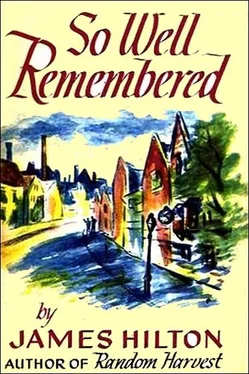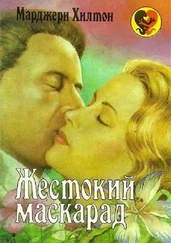Джеймс Хилтон - So Well Remembered
Здесь есть возможность читать онлайн «Джеймс Хилтон - So Well Remembered» весь текст электронной книги совершенно бесплатно (целиком полную версию без сокращений). В некоторых случаях можно слушать аудио, скачать через торрент в формате fb2 и присутствует краткое содержание. Год выпуска: 1945, Жанр: Проза, на английском языке. Описание произведения, (предисловие) а так же отзывы посетителей доступны на портале библиотеки ЛибКат.
- Название:So Well Remembered
- Автор:
- Жанр:
- Год:1945
- ISBN:нет данных
- Рейтинг книги:5 / 5. Голосов: 1
-
Избранное:Добавить в избранное
- Отзывы:
-
Ваша оценка:
- 100
- 1
- 2
- 3
- 4
- 5
So Well Remembered: краткое содержание, описание и аннотация
Предлагаем к чтению аннотацию, описание, краткое содержание или предисловие (зависит от того, что написал сам автор книги «So Well Remembered»). Если вы не нашли необходимую информацию о книге — напишите в комментариях, мы постараемся отыскать её.
So Well Remembered — читать онлайн бесплатно полную книгу (весь текст) целиком
Ниже представлен текст книги, разбитый по страницам. Система сохранения места последней прочитанной страницы, позволяет с удобством читать онлайн бесплатно книгу «So Well Remembered», без необходимости каждый раз заново искать на чём Вы остановились. Поставьте закладку, и сможете в любой момент перейти на страницу, на которой закончили чтение.
Интервал:
Закладка:
George realized there was a misunderstanding somewhere, though he could not yet tell what. For a moment the wild thought seized him that this Winslow might not be of the same Winslow family at all. He said: “I’m sorry if I’m making a mistake. I was referring to LORD Winslow—the one who used to be Secretary of Housing—”
A strange muffled sound came from the bed, uninterpretable except as one of relief, though the words that followed were still tense with excitement: “You certainly have got it all balled up, Mr. Mayor… That was my GRANDfather.”
George described the rest of the interview to Wendover the same evening. “Aye, it was my mistake all right, but even when I realized it I didn’t realize everything else immediately, because he kept on asking me about his father—did I KNOW anything, had there been any news, and so on —and of course I could only repeat what I’d heard from the man in London—that they’d both got out of Singapore in time. But then he told me they hadn’t been in Singapore at all, but in Hong Kong, where his father had a job.
“I didn’t stay long after that. I could see I’d put him in a nervous mood, and I felt it was my fault, in a way, for not verifying things beforehand. And I was a bit excited myself, because it was hard to realize that he must be Livia’s boy—and not more than twenty-two, if that… Charles, he told me his name was… I could have talked better to his father, if it had been him, but with the boy I felt tongue-tied… because as he went on talking it became clear to me that he hadn’t the faintest idea who I was —or rather who I had been in his mother’s life.”
“You didn’t tell him?”
“No, Harry, I didn’t.”
“He must have thought it odd that you should take all that trouble to visit him.”
“Aye, and he said so, before I left. He got quite cordial—in a nervous sort of way. He tried to apologize for having refused to see me the day before—he blamed what he called the superstition that provincial mayors are pompous old bores—‘I wonder why people think so,’ he said, and although it was a back-handed compliment, I knew he was meaning it all right. So I answered: ‘Probably because many of ‘em are’—and we had a good laugh. Or rather, he couldn’t laugh, but I knew it was the same as if he was laughing… I promised to visit him again. He made a point of asking me to, if ever I was in that part of the world.”
“Don’t you intend to tell him?”
“Not just yet. I don’t see that it can matter much—to HIM. Or if it did, it wouldn’t help. You see, he NEEDS help. His nerves are all to pieces and he’s pretty low-spirited about things in general—I gathered that. Maybe I can cheer him up… and if I can’t—if he finds me a nuisance—then it’ll be easier for him to tell me so if he thinks I’m only the Mayor of Browdley.”
Wendover smiled. “You’d make a good Jesuit, George. You can find more reasons for doing what you want to do…”
George visited the Mulcaster hospital every week or so from then on. Not all the visits were on account of Winslow; some would have had to be made on official business in any case. But he found himself looking forward to them all, and not grudging the length of the journey, which meant less sleep, for it was in the nature of his own work that hardly any of it could be postponed, shortened, or abandoned. And gradually, as the youth continued to improve, there came to George the intense pleasure of noting definite improvements each time—the slow removal of bandages; the first time the cradles and slings were discarded; the first step from the bed to a wheel-chair; and most of all, the lifting of the mind from despondency. All this took months, and the visits, though regular, could not last long. The Mayor of Browdley was curiously shy during the early ones—almost desperately afraid of intruding where he might not be really as welcome as it appeared—reluctant, it would seem, to believe that the invitations to come again were genuine. It was unlike George, who was so used to being liked, to have such diffidence; and yet there was in him all the uncertainty of a man in whom the touch of bravado masks only a deep humility and an awareness of personal inadequacy.
They talked of many things, from hospital gossip to world affairs, with no plan or aim in the talking; and this, perhaps, was as good a way to get to know each other as if either had deliberately tried. George was often tempted to lead the subject to Livia, but always forbore; he had an odd feeling of conscience about it—that his own concealment of identity could only be justified so long as he did not take such advantages. Sometimes, however, information slipped out without any probing. Charles liked to talk about the family home in Berkshire, the big centuries-old house that belonged now to his uncle, the inheritor of the title—“and thank Heaven it does —my father never wanted it, and neither do I, though it’s a lovely old place to visit.” He spoke affectionately of both parents, but seemed to have spent comparatively little time with them since he was very young. “But that’s the way it is when your people are overseas. They pack you off to school in England and you hardly see them for years at a stretch, and then when you do they’re almost strangers. It was better for a while after 1934, when dad gave up his job and they went to live in Ireland, near Galway. It was a sort of farm, and I used to stay there during the school holidays. Mother made a good farmer—she had a knack for anything to do with crops or animals. She could squeeze warbles on a cow, and that’s a thing you can’t do without being sick unless you really love farming.”
George didn’t enquire what squeezing warbles was.
“And yet she could be the great lady too—doing the society stuff if ever she felt like it. I’ve often thought she’d have made a damn fine actress… And when she made up her mind about something, nothing on earth or under heaven would stop her… My God, the wires she pulled to get out to Hong Kong after the war started.”
“I thought you said he’d given up the job.”
“He had, but he didn’t much like farming, and after a year of it he went abroad again—for an oil company. Mother didn’t like it, but she followed him, and I didn’t see either of them again till ‘thirty-nine, when they came home on six months’ leave. They were still in London in the September, and father offered his services to the Government but they told him he couldn’t do better than go back to his job with the oil company. So he did—alone at first, because of the war and because mother was mad with him for wanting to go back at all—but of course she soon followed as before. She always followed him everywhere, though I guess they neither of them expected to end up in a Jap prison-camp.”
“End up?”
“Well, no, I didn’t mean THAT. Oh God, I hope not.”
“You don’t really know what happened?”
“Not a thing—except that they WERE in Hong Kong when the Japs took over. That’s definite. All the rest is rumour.”
George caught the sudden tremor in his voice, and made haste to change the subject.
Once—and for the first time since the initial interview and misunderstanding—they mentioned the former Lord Winslow. “I don’t really remember him,” Charles said. “I think he disapproved of dad’s marriage, or something of the sort. But from all accounts he was a very distinguished piece of Stilton in his way.”
George was not quite sure what this meant; besides, he was thinking of the phrase ‘something of the sort’ and wondering how much, or little, it concealed. “A great authority on housing,” he remarked safely.
Читать дальшеИнтервал:
Закладка:
Похожие книги на «So Well Remembered»
Представляем Вашему вниманию похожие книги на «So Well Remembered» списком для выбора. Мы отобрали схожую по названию и смыслу литературу в надежде предоставить читателям больше вариантов отыскать новые, интересные, ещё непрочитанные произведения.
Обсуждение, отзывы о книге «So Well Remembered» и просто собственные мнения читателей. Оставьте ваши комментарии, напишите, что Вы думаете о произведении, его смысле или главных героях. Укажите что конкретно понравилось, а что нет, и почему Вы так считаете.










